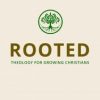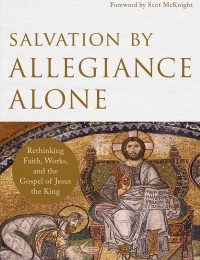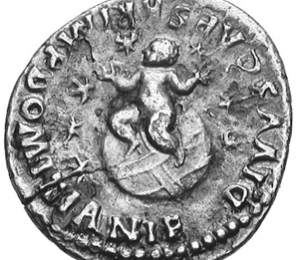
If you’re anything like me, you’ve had your favorite dinnertime evangelists, the local Jehovah’s Witnesses, show up at your door. They’re kind. They smile. And they even tuck in their shirts. To top it all off, they speak Christianese pretty well.
Or do they?
Though they sound like Christians, they come bearing bad news–an anti-gospel that denies the divinity of Jesus and only offers the possibility of Heaven for a select few people. Their gospel sounds so close to the biblical gospel that Christians are sometimes led astray by them. Christians who deny the importance of good theology or pay no attention to it might be walking right into Satan’s age-old trap of twisted salvation.
Good theology matters because true salvation matters.
Everyone a Theologian
The word theology, made up of the words theos (God) and logos (word), literally means “words about God’ or “God talk.” Theology is a multi-faceted discipline that ultimately describes who God is and what he does. And when Jesus stepped into human history as the God-man, theology was personified. Talking about God is doing theology, and we all talk about God. So, you guessed it–we’re all theologians.
When we say, “God is love” or “Jesus is Lord” or “We need a Savior,” we’re doing theology, we’re talking about God. We’re describing him in some way, whether it’s a direct attribute (God is good) or something he says about us (we’re not good). God is the anchor of our theology, and everything we say in relation to that is theological. We’re being theologians. The question is, are we good or bad theologians?
It should be obvious, then, that theology is the language of Christianity. Christianese isn’t the dialect of Ned Flanders; it’s the gospel-drenched, worship-laden language of God’s people. We of all people should be consistent, contagious God-talkers. Yet many people act as though theology is alien to the nature and acts of God. Loving God isn’t about a set of doctrines, they say–it’s about a relationship. For them, theology is just an academic sport for professionals, but it’s not important for the Christian’s daily life; theology belongs in outer space, not in our hearts.
Their irritation is understandable. Theology is often relegated to so-called professionals–pastors hold it for themselves to maintain the title role of Answer Man; professors write and teach as though they learned a special language that only five people at a theology conference can understand; academic authors write 900-page theological treatises that could’ve been 300 pages, most of which require a Thesaurus; and armchair theologians spend more time reading and debating theology than actually teaching it to anyone else. Theology can seem like a set of shackles rather than an anchor; it causes more problems than it solves.
When theology is abused in those ways, when it feels like a set of shackles, people want nothing to do with it. But we don’t have to let the misuse of theology be the last word. In fact, we can’t let it be the last word, because we cannot be Christian without theology. A theology-less Christianity is a mute, lifeless religion. The Christian God defines and demonstrates theology. I can’t talk about my wife without describing Christa Smith, and Christians can’t talk about theology without describing God. So though theology can be divisive, we can’t avoid it. Even the person who claims to love Jesus but hates theology believes in Jesus based on theological affirmations. That’s the difference between them and a Jehovah’s Witness.
Robert Jenson once said that theology is “a sort of grammar. The church, we must say, is the community that speaks Christianese, and theology formulates the syntax and semantics of this language.”
Theology is the grammar of the Christian faith. We can’t avoid it. We can’t ignore it. Christians speak a unique way because they hear a unique voice–the voice of God–in their hearts and in their Bibles. Church grammar can be boiled down to five foundational concepts:
- God is a theological God
- The Bible is a theological book
- The gospel is a theological message
- The Church is a theological mouthpiece
- The Christian life is a theological demonstration
1. God Is a Theological God
“God is a theological God.” Duh, right? This should be obvious, considering what we just said about the literal meaning of the word theology. But we also noted that God is often relegated to a pen pal rather than the One who defines theology.
Jeff Medders recently wrote a fantastic article, in which he said:
“Having a right and rotund theology of God is vital to our discipleship with Jesus Christ. Theology isn’t meant to be quarantined to books on shelves, or chained to the grounds of a seminary’s campus. Theology is for everyday Christianity, for us “ordinary” Christians, for all of life, in all of life, for the glory of God. Theology is always relevant because God is omni-relevant.
Theology is everywhere because God is everywhere. His omnipresence provides a fresh lens for the present. It’s easy to take cheap shots at theology as being a mere mind-filler, but thanks be to God it is more. … God loves theology. God’s world is a free seminary course for every saint under the sun.”
Continuing Jeff’s metaphor, we must understand that God is the great Theology Professor. Like any good professor, he not only teaches us theology–he inspires us toward it. Every word of God is theological, because every word of God shows us who he is and how all things orbit around him.
When he says, “I AM WHO I AM” (Ex. 3:14), he’s telling us that he’s sovereign and that we should both worship and trust him. When Jesus says, “Come to me, all of you who are weary and burdened, and I will give you rest” (Matt. 11:28), he’s telling us that he’s not only sovereign, but kind and loving and merciful. When Jesus tells us that the Spirit “will teach you all things and remind you of everything I have told you” (John 14:26), he’s telling us that God is so committed to preserving and growing our theology, he’s setting up shop inside of us (1 Cor. 6:19). Theology matters to God.
Nature talks about him (Ps. 19:1), and he talks about himself to us (John 14:26). We talk about him when we praise him, and we talk about him when we deny him. Even atheists–the most disgruntled theologians of all–do theology by pronouncing his irrelevance. We cannot escape our theological God.
2. The Bible Is a Theological Book
The Bible is the very Word of God (2 Tim. 3:16-17). Its words flow from God and its words point to God. Its words tell us about who God is and who we are in relation to him. The Bible is a theological book because it talks about God. Mastering and being mastered by God’s Word is a theological endeavor.
There’s a difference between Baptists and Methodists, Seventh Day Adventists and Presbyterians, Lutherans and Pentecostals, and so many others who consider the Bible God’s Word. Why? Because they’re all trying to piece together the theology overflowing from the pages of Scripture. The Bible is so theological that Christians for centuries have debated how to interpret and apply its theology. While we’d all love for everyone everywhere to agree on theology, the depth and beauty of the Bible’s theology is also awe-inspiring. In a sense, we should be encouraged by the fact that we will never fully plumb the depths of the Bible’s wisdom. We will never run out of theology to grow and shape us.
Some of the strongest Bible-believing Christians on the planet despise theology. They don’t like that it divides Christians. They don’t like that people care more about theology than evangelism. Amen! But in all their frustration with theology, they can’t avoid it. If they read the Bible, they’re reading about the character and work of God. They’re nose-deep in theology.
3. The Gospel Is a Theological Message
The gospel means “good news,” and it’s often rightly described as an announcement or a message. The gospel announces the good news that Jesus is on the throne and that salvation is found in no other name (Acts 4:12). The gospel is grounded in the Trinitarian God’s rescue mission to redeem all things. In love, the Father sent the Son to defeat sin and death, and the Son sent the Holy Spirit to helps us live in light of it. The gospel proclaims the most basic and beautiful theology of all–the glory of God in the redemption of all things.
The gospel and all of its theological richness is a prime example of why anyone and everyone is a theologian. Elementary school children can understand the gospel’s theology–that God made all things perfect, sin entered the world, God sent a Savior to forgive our sins, and one day he will make all things new. Theology is not scary when you think of how it forms the backbone to the gospel. Instead, it becomes life-altering and drives us to share it.
And we don’t share the gospel of the Mormons or the gospel of the Jehovah’s Witnesses. They lead people to destruction because they teach damnable theology about who God is, who Jesus is, and what it means to follow Christ into eternity. But the gospel of Jesus found in the 66 books of Scripture leads people to eternal life, because it points people to right theology–it shows people the truth about who God is, who Jesus is, and what it means to follow Christ into eternity. The difference between a right and wrong gospel is the difference between the theology it proclaims.
4. The Church Is a Theological Mouthpiece
When Jesus told his disciples that the Church would overrun even the gates of Hell (Matt. 16:18), he was telling them a theological truth. The Church, God’s people, are armed with theology that Satan can’t touch. Remember, Satan knows theology. “Even the demons believe, and tremble” (Jam. 2:19). But he hates the theology he’s known for multi-millennia. He is a mouthpiece for hatred of good theology; the Church is a mouthpiece for the love of good theology.
When God’s people gather together on Sundays and any other day, we’re proclaiming that God is King and Satan is not. We’re telling God, each other, and the world around us that we’re joined together not by shared hobbies or personalities, but by the same theology. When we preach and sing and pray and take the Lord’s Supper and celebrate baptisms, we’re worshiping the same God. We’ve been changed by the same gospel with the same theological foundations.
5. The Christian Life Is a Theological Demonstration
As Kevin Vanhoozer argues in books like Faith Speaking Understanding, theology shapes the performance of the Christian life–it is the script of the unfolding drama of God’s work in the world. We demonstrate theology in the way we live. If we follow the script, acting out right theology, we demonstrate to others who God is and what he is doing in the world. In a very real sense, the audience only knows the Playwright’s script if the actors demonstrate it properly.
Our theology can’t be separated from our lives. As Russell Moore describes in the foreword to my book:
“Theology separated from mission—that is, separated from the life that Jesus has called us to live in him—is not biblical theology. Christ Jesus said that his sheep hear his voice, and they run toward it. Hearing the voice of Christ makes us move. This is because theology isn’t ultimately about a “what” but about a “Who.” Theology is to show us how God patterned the universe after Jesus Christ, how he is summing up all things in Christ, how in Christ he as put together a plan to reconcile humanity to God and to one another, thus freeing the whole universe to be what it was created to be as the theater of God’s glory.”
If we ignore theology, we confuse ourselves and the world about the God we claim to worship. Without right theology, we’re boats on the stormy seas without an anchor. We become like those who Paul says are “tossed by the waves and blown around by every wind of teaching, by human cunning with cleverness in the techniques of deceit” (Eph. 4:14). We may point to God, but we may not point to him correctly. We’re one doorbell away from becoming a Mormon or Jehovah’s Witness or something else. We may point to him the way false gospels do, which is ultimately not pointing to him at all.
More than that, if we’re not believing right theology, our lives won’t reflect rightly about God. Good living is rooted in good theology. So God doesn’t simply want us to have good theology; he wants all people everywhere to have good theology. As his disciples who are called to make more disciples, it is important for us to tell people about him in a proper way. We don’t want them to just know about God, but to know God as he has revealed himself.
When we tell the truth, love the unloveable, give to the poor, fight for the unborn, remain faithful to our spouses, and countless other gospel-directed deeds, we’re saying something about who God is. We love because he loves us. We forgive because he forgives us.
Christians speak church grammar–words shaped by theology.





